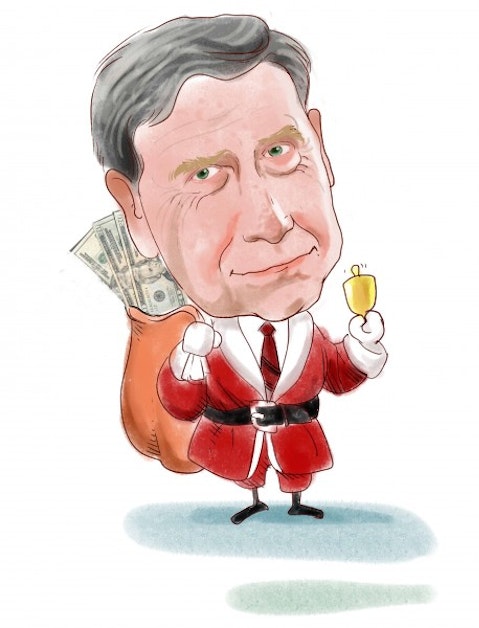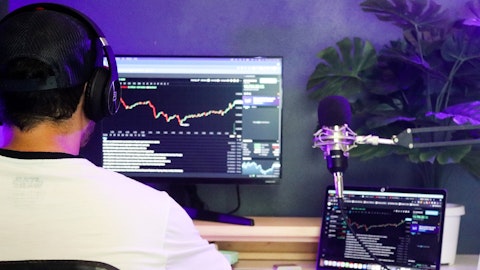In this article, we will look at 10 stocks least vulnerable to a recession. If you want to explore similar stock ideas, you can also read 5 Stocks Least Vulnerable to Recession.
The Fed Resorting to Its Tools
We are over two quarters into 2022 and there is havoc in the stock market. The Fed is sticking to its regimen of hiking interest rates. After raising rates by 75 basis points on June 15, Fed chair Jerome Powell hinted that the central bank will consider hiking interest rates further in July by another 50 or 75 basis points, at its scheduled FOMC meeting on July 26. However, after the latest commentary released by the Labor Department showed that the Consumer Price Index in June rose to 9.1% year-over-year, financial experts are anticipating a full percentage point rate hike in July.
The Fed’s Inflation Problem is Worsening
The June 2022 CPI released by The Bureau of Labor Statistics saw the overall CPI rising 9.1% year-over-year, the highest since 1981. Energy prices soared and the energy index rose 41.6% year over year attaining a 40-year high. The food index registered a 10.4% rise year over year and also attained a 40-year high. The all items less food and energy index dipped to 5.9% in June, from 6.0% in May, and its decade-high of 6.5% in March.

Investors and Analysts On The Chances of A Recession
Larry Fink, founder and CEO of BlackRock, Inc., was recently interviewed by Jim Cramer on CNBC about the current inflation situation and the probability of a recession. Asked if he sees the U.S. threatened by inflation, geopolitical tensions, or if the current situation is normal for business as usual, Larry Fink responded:
“It’s definitely business as usual. When I started my career we had much higher inflation and much more problems in our country, we’re gonna get through this. We do have really elevated inflation, a lot of it is policy generated or immigration policy generated, I could go on…”
Jim Cramer asked Larry Fink if he sees the U.S. heading into a recession. Mr. Fink shared his view which he built on top of his argument that the inflation problem in the U.S. is more related to supply than to demand. Mr. Fink said:
“Demand is actually unchanged since 2019. People don’t understand that demand has not changed that much. But the reality is we have supply problems because of supply chains- obviously we have the Russia-Ukraine war that aggravated this more, and then we had a monstrous sum of monetary policy and fiscal stimulus over the last few years. It’s all leading to this really elevated inflation. But this is all fixable.”
Larry Fink also noted that commodity prices have rebounded and supply chains are recovering as part of his view on the probability of a mild recession. He said:
“Supply chains in a lot of industries is getting better right now. The federal reserve is tightening and the Fed’s tool is to tighten and through tightening they limit demand. So, is there a risk of a recession? Sure, and even if we are in one it is going to be quite mild…”
Druckenmiller Predicts Recession
Stanley Druckenmiller, the founder of Duquense Capital, is a prominent figure in the investment world and has been famed for his thesis, analysis, and predictions in the past. He gave his latest predictions at the 2022 Sohn Conference. Mr. Druckenmiller weighed in on the chances of the U.S. entering a recession and said:
“We have never had a soft landing after inflation’s gotten above 4 and a half percent and the situation we face now is extraordinary, where the Fed… we are at 75 basis points now and I can’t keep up but even the projections of 2 percent, you are so far behind the inflation rate and there is so much wood to chop and there’s been such a broad asset bubble going into it, it’s very hard for me to say that the probabilities favor a soft landing indeed I think they aggressively point to a hard landing…
I think history is gonna win. Once inflation gets about five percent, it’s never come down without a recession and I think a recession is in the cards, I just don’t know when. We have about, depending on who you listen to, a trillion and a half to two trillion of excess savings now, so it may take some time to work through that savings but given the extent of the asset bubble and the destruction in the markets, given what’s going on in Ukraine, given the zero-Covid policy in China, I don’t take a lot of comfort from that. I assume we’re going to have a recession sometime in ’23, I just don’t know whether it’s going to be in the early part or the later part…”

Where Investors are Putting Their Money Amid Recession Fears
In a rising rate environment, noncyclical sectors remain resilient due to the nature of their businesses and products. Consumers simply cannot cut back spending on staples, utilities, and healthcare, even in an economic slowdown, which makes these sectors least vulnerable to a recession. Some of the best stocks to invest in for investors looking to recession-proof their portfolios are The Coca-Cola Company (NYSE:KO), The Procter & Gamble Company (NYSE:PG), and Johnson & Johnson (NYSE:JNJ).
Our Methodology
To determine 10 stocks least vulnerable to a recession, we reviewed companies that belonged to noncyclical industries such as consumer staples, utilities, and healthcare. We narrowed down our selection to stocks that received consensus positive ratings from analysts and had positive investor sentiment. We have ranked our picks in increasing order of the number of hedge funds having stakes in them.
10 Stocks Least Vulnerable to A Recession
10. DTE Energy Company (NYSE:DTE)
Number of Hedge Fund Holders: 28
DTE Energy Company engages in utility operations in the United States and generates electricity through fossil fuels, hydroelectric pumped storage, nuclear plants, and other renewable assets. The utility sector is one that will not feel the repercussions of a recession, and DTE Energy Company (NYSE:DTE) is an attractive stock with the added feature of dividends. As of July 20, DTE Energy Company (NYSE:DTE) is offering a forward dividend yield of 2.85% and has gained 5.58% over the past twelve months.
On July 11, Mizuho analyst Anthony Crowdell trimmed his price target on DTE Energy Company (NYSE:DTE) to $130 from $137 but reiterated a Buy rating on the shares. The analyst noted that DTE Energy Company (NYSE:DTE) has become a “high-quality, pure-play story”, and sees long-term earnings growth for the company in a range between 5% and 7%.
At the close of Q1 2022, 28 hedge funds were long DTE Energy Company (NYSE:DTE) and held stakes worth $482.27 million in the company. This is compared to 27 positions in the prior quarter with stakes worth $778.96 million.
In the first quarter of 2022, Millennium Management raised its stakes in DTE Energy Company (NYSE:DTE) by 28%, bringing them to $139.73 million. Millennium Management is the largest shareholder in the company as of March 31.
9. Duke Energy Corporation (NYSE:DUK)
Number of Hedge Fund Holders: 32
Duke Energy Corporation (NYSE:DUK) is another compelling utility stock to go long in before a recession due to its legacy operations and market-leading position. The company operates through three business segments: Electric Utilities & Infrastructure, Gas Utilities & Infrastructure, and Commercial Renewables. The company is focusing on making its operations sustainable. On July 16 Lynn Good, CEO of Duke Energy Corporation (NYSE:DUK) appeared in an interview on CNBC in which she reported that the company’s carbon emissions have reduced by 45% since 2005. Lynn Good also reported that Duke Energy Corporation (NYSE:DUK) is experimenting with nuclear energy as part of a transition away from fossil fuels and plans to achieve net zero carbon emissions by 2050.
On July 13, Duke Energy Corporation (NYSE:DUK) announced that its board of directors has declared a quarterly cash dividend of $1.005 per share. The dividend is payable on September 16 to investors of record on August 12. As of July 20, the stock has a forward dividend yield of 3.81%.
On July 19, Barclays analyst Eric Beaumont cut his price target on Duke Energy Corporation (NYSE:DUK) to $110 from $119 and reiterated an Equal Weight rating on the shares.
At the end of Q1 2022, 32 hedge funds were bullish on Duke Energy Corporation (NYSE:DUK) and held stakes worth $1.04 billion in the company. This is compared to 36 positions in the preceding quarter with stakes worth $1.13 billion.
As of June 30, Beech Hill Partners is the largest stakeholder in Duke Energy Corporation (NYSE:DUK) and has stakes worth $1 million in the company.
8. Dominion Energy Inc. (NYSE:D)
Number of Hedge Fund Holders: 34
Dominion Energy Inc. (NYSE:D) produces and distributes energy through four segments: Dominion Energy Virginia, Gas Distribution, Dominion Energy South Carolina, and Contracted Assets. As of July 19, Dominion Energy Inc. (NYSE:D) has a forward dividend yield of 3.43%. Moreover, Dominion Energy Inc. (NYSE:D) is a top recession stock pick of Wells Fargo analysts.
As of June 30, UBS analyst Ross Fowler has a $90 price target and a Buy rating on Dominion Energy Inc. (NYSE:D). On July 19, Barclays analyst Eric Beaumont trimmed his price target on Dominion Energy Inc. (NYSE:D) to $86 from $93 and reiterated an Equal Weight rating on the shares.
As of June 30, Beech Hill Partners is the most prominent stakeholder in Dominion Energy Inc. (NYSE:D) and has stakes worth $1.5 million in the company. The investment covers 0.81% of Beech Hill Partners’ 13F portfolio.
Dominion Energy Inc. (NYSE:D) is on investors’ radars as recession looms. At the close of Q1 2022, 34 hedge funds were eager on Dominion Energy Inc. (NYSE:D) and disclosed stakes worth $695.67 million in the company. This is compared to 34 hedge funds a quarter ago with stakes worth $776.60 million.
7. The Kraft Heinz Company (NASDAQ:KHC)
Number of Hedge Fund Holders: 35
The Kraft Heinz Company (NASDAQ:KHC) manufactures and markets food and beverage products in the United States, Canada, the United Kingdom, and internationally. The company’s products include condiments and sauces, cheese and dairy products, meals, meats, refreshment beverages, coffee, and other grocery products. As of July 20, The Kraft Heinz Company (NASDAQ:KHC) has a forward dividend yield of 4.21%, which the company backs with trailing twelve-month free cash flows of $4.14 billion.
Wall Street analysts are bullish on The Kraft Heinz Company (NASDAQ:KHC). On July 18, Deutsche Bank analyst Steve Powers trimmed his price target on The Kraft Heinz Company (NASDAQ:KHC) to $47 from $48 but reiterated a Buy rating on the shares. Moreover, Mizuho analyst John Baumgartner initiated coverage of The Kraft Heinz Company (NASDAQ:KHC) with a Buy rating and a $48 price target.
At the end of Q1 2022, 35 hedge funds held stakes in The Kraft Heinz Company (NASDAQ:KHC) worth $13.44 billion. This is compared to 39 positions a quarter ago with stakes worth 12.21 billion.
As of March 31, Berkshire Hathaway owns more than 325.6 million shares of The Kraft Heinz Company (NASDAQ:KHC) and is the largest shareholder. The fund’s stakes were valued at $12.82 billion and the investment covers 3.52% of Warren Buffett’s 13F portfolio.
Like The Coca-Cola Company (NYSE:KO), The Procter & Gamble Company (NYSE:PG), and Johnson & Johnson (NYSE:JNJ), The Kraft Heinz Company (NASDAQ:KHC) offers staple products and has an inflation-resilient business model.
6. Colgate-Palmolive Company (NYSE:CL)
Number of Hedge Fund Holders: 50
Institutional investors are stacking up on Colgate-Palmolive Company (NYSE:CL) shares to recession-proof their portfolios. At the close of Q1 2022, 50 hedge funds disclosed ownership of stakes in Colgate-Palmolive Company (NYSE:CL). The total value of these stakes amounted to $2.59 billion, up from $2.06 billion a quarter ago with 48 positions. The hedge fund sentiment for the stock is positive.
Colgate-Palmolive Company (NYSE:CL) is an analyst’s favorite consumer staples stock at Evercore ISI. As of June 28 Robert Ottenstein, an analyst at Evercore ISI, has a buy-side Outperform rating and a $90 price target on the stock. Ottenstein noted that Colgate-Palmolive Company (NYSE:CL) has a defensive product portfolio which shelters it from macroeconomic pressures. On June 20, Deutsche Bank analyst Steve Powers trimmed his price target on Colgate-Palmolive Company (NYSE:CL) to $87 from $88 but reiterated a Buy rating on the shares.
On June 9, Colgate-Palmolive Company (NYSE:CL) declared a quarterly cash dividend of $0.47 per share, payable on August 15 to investors of record at the close of business on July 21. As of July 19, the stock has a forward dividend yield of 2.44%
As of June 30, Ayrshire Capital Management has stakes worth $3.76 million in Colgate-Palmolive Company (NYSE:CL) and is the most prominent shareholder. The investment covers 2.66% of Ayrshire Capital Management’s 13F portfolio.
Consumer spending on products offered by The Coca-Cola Company (NYSE:KO), The Procter & Gamble Company (NYSE:PG), Johnson & Johnson (NYSE:JNJ), and Colgate-Palmolive Company (NYSE:CL) is expected to remain robust and invulnerable in a recessionary environment.
Click to continue reading and see 5 Stocks Least Vulnerable to Recession.
Suggested articles:
- Michael Burry is Buying These 10 Stocks As Recession Fears Mount
- Jim Cramer Recommends These 10 Stocks For Recession
- 10 Best Recession Stocks to Buy According to Wells Fargo
Disclosure: None. 10 Stocks Least Vulnerable to Recession is originally published on Insider Monkey.





